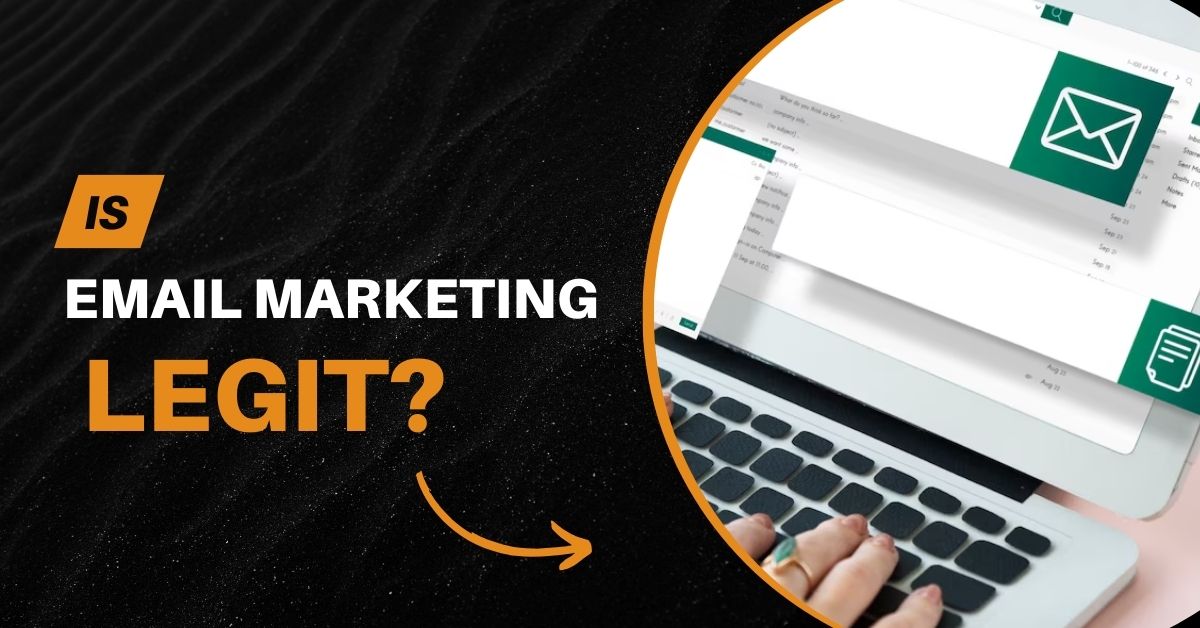Is Email Marketing Legit?
We see a lot of marketing everywhere—on social media, in videos, on websites, and even in our inboxes. One of the oldest and most common forms of online marketing is email marketing. But many people ask: “Is email marketing legit?” Let’s understand what email marketing is, how it works, and whether it’s truly a legitimate way to promote products or services.
What is Email Marketing?
Email marketing is a way for businesses or individuals to send messages to people through email. These messages usually contain information about a product, service, or offer.
For example, you may have signed up on a shopping website and later received an email offering a discount. That is email marketing.
Businesses use it to:
- Share news or updates
- Offer special deals or coupons
- Inform customers about new products
- Stay connected with their audience
It’s a simple and direct way to reach people.
Why People Doubt Email Marketing
Some people think email marketing is spam or a scam. That’s because many spam emails also come to our inboxes. These are usually from unknown sources and often promise something that seems too good to be true.
Spam emails are different from real email marketing. Spam is often sent without permission and is usually unrelated to anything you signed up for.
Legit email marketing, on the other hand, is permission-based. That means you only receive emails from businesses you agreed to hear from.
The Difference Between Spam and Legit Email Marketing
Let’s make this clear with a simple comparison:
| Spam Emails | Legit Email Marketing |
|---|---|
| Sent without permission | Sent only if you sign up |
| Often have fake or shady links | Come from real businesses |
| Usually irrelevant | Related to your interests |
| No option to unsubscribe | Always gives you the choice to stop |
So, yes—email marketing is legit when done the right way.
Why Do Businesses Use Email Marketing?
Businesses love email marketing because:
- It’s low-cost
- It reaches people directly
- It can be personalized
- It’s easy to track
They can see who opened the email, who clicked on the link, and who bought the product.
This helps them know what works and what doesn’t.
Is Email Marketing Legal?
Yes, email marketing is legal if it follows certain rules.
In many countries, there are laws that control how email marketing should be done. These laws help protect people from spam and scams.
For example, in the U.S., there’s a law called CAN-SPAM Act. It says:
- Marketers must not lie in their emails
- They must include their business address
- They must offer a clear way to unsubscribe
So as long as businesses follow these rules, email marketing is not only legit—it’s also legal.
Does Email Marketing Really Work?
Yes, it works—if it’s done right.
When a business sends useful, honest, and relevant information to people who want to receive it, the results can be very good.
In fact, studies show that email marketing brings one of the highest returns on investment (ROI) compared to other types of digital marketing.
That means businesses make more money from it than they spend.
What Makes Email Marketing Effective?
Email marketing works best when:
- The content is valuable – This means giving people something helpful, like tips, offers, or updates they care about.
- It’s not too frequent – Sending too many emails can annoy people. A good business respects your inbox.
- It’s personalized – Saying “Hi John” instead of “Dear Customer” makes a big difference.
- It gives control to the reader – Every email should allow people to unsubscribe easily if they no longer want the emails.
Can Small Businesses Use Email Marketing?
Absolutely! You don’t have to be a big company to do email marketing. Even small businesses, freelancers, or bloggers use it to connect with their audience.
There are many email marketing tools like:
- Mailchimp
- Constant Contact
- ConvertKit
- Sendinblue
These tools help you design emails, manage lists, and track results.
Most of them offer free plans for beginners.
What About Scams in Email Marketing?
Yes, scams can happen, just like in any part of the internet. Some people send fake emails pretending to be real companies. These are called phishing emails.
They may try to steal your personal info or ask for payment.
But this doesn’t mean that all email marketing is a scam.
To stay safe, always:
- Check the sender’s email address
- Don’t click on strange or suspicious links
- Avoid giving out sensitive info through email
- Look for spelling mistakes or bad formatting (these are often signs of fake emails)
How to Tell if an Email is Legit
Here are some signs that an email is from a real, trusted source:
- It has a clear subject and message
- It comes from a business you know
- It includes the business’s address and contact info
- It gives you an option to unsubscribe
- It doesn’t make unrealistic promises
If all these things are there, it’s most likely a legit marketing email.
Final Answer: Is Email Marketing Legit?
Yes, email marketing is 100% legit—when it’s done the right way.
It is:
- Legal
- Ethical
- Effective
- Safe (when from trusted sources)
- Used by millions of businesses every day
It only becomes a problem when people abuse it by sending spam or scam emails. But that’s not the fault of email marketing itself—it’s the fault of bad actors.
So, if you’re a business owner, you can safely use email marketing to grow your audience. And if you’re a customer, you can enjoy helpful offers and updates—just make sure to sign up only on trustworthy websites.
Summary
- Email marketing is a way of sending messages through email to promote products or services.
- It is legit and legal when done with permission and follows rules.
- It works well for both big and small businesses.
- Scams do exist, but they are not part of proper email marketing.
- You can protect yourself by knowing the signs of a real email.
Whether you’re sending or receiving, email marketing—when done right—is a powerful and trustworthy tool in the digital world.
Also Read:
- How to Spy on Your Competitors’ Email Marketing Strategy
- What is a Mid-Cycle Marketing Email?
- How Can Email Marketing Fuel Your Overall Inbound Strategy?
- What Information Can the Marketer Learn from Email Marketing Analytics?
Frequently Asked Questions
Is email marketing really a legal method?
Yes, email marketing is legal as long as businesses follow the rules like getting permission from users, being honest in the message, and allowing people to unsubscribe easily. There are laws like the CAN-SPAM Act that protect users from spam and ensure safe email communication.
What makes email marketing trustworthy?
Email marketing becomes trustworthy when it is sent by known businesses, has valuable content, and gives people the choice to unsubscribe. It should never feel forced. A legit email has the brand’s contact info and is sent only to people who chose to receive it.
How can I know if an email is a scam?
Scam emails often look strange, have spelling mistakes, or offer something too good to be true. Always check the sender’s email address and don’t click on unknown links. Real emails come from trusted brands, with clear messages and an option to unsubscribe.
Do small businesses use email marketing?
Yes, email marketing is great for small businesses. It helps them stay connected with customers, promote their products, and build trust. It doesn’t cost much and can reach people directly, even if the business has just started or has a small budget.
Why do people think email marketing is spam?
Some people confuse legit email marketing with spam because both show up in the inbox. But real email marketing is permission-based and useful. Spam is usually sent without permission, often with shady links or fake offers. That’s why some people feel unsure about it.


